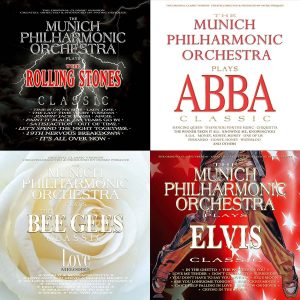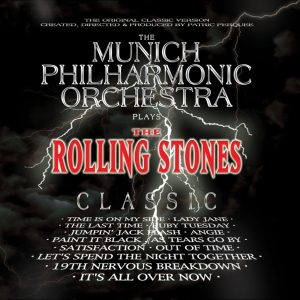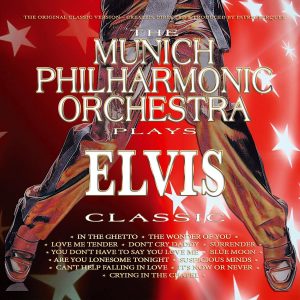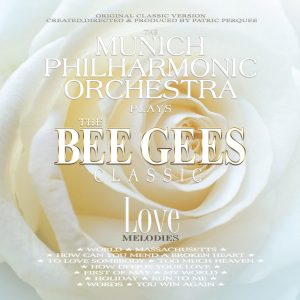- Munich Philharmonic Orchestra01 - Time Is On My Side 3:04
- Munich Philharmonic Orchestra02 - Lady Jane 3:20
- Munich Philharmonic Orchestra03 - The Last Time 3:48
- Munich Philharmonic Orchestra04 - Ruby Tuesday 3:33
- Munich Philharmonic Orchestra05 - Jumpin´Jack Flash 3:22
- Munich Philharmonic Orchestra06 - Angie 4:30
- Munich Philharmonic Orchestra07 - Paint It Black 3:07
- Munich Philharmonic Orchestra08 - As Tears Go By 3:02
- Munich Philharmonic Orchestra09 - Satisfaction 3:47
- Munich Philharmonic Orchestra10 - Out Of Time 3:50
- Munich Philharmonic Orchestra11 - Let´s Spend The Night Together 3:52
- Munich Philharmonic Orchestra12 - 19th Nervous Breakdown 4:00
- Munich Philharmonic Orchestra13 - It´s All Over Now 3:03
Dear music-lovers,
I am glad that you are listening to my production ‘The Munich Philharmonic Orchestra Plays ROLLING STONES Classic’. Would you have believed how much musical potential and how many beautiful melodies were hiding behind the pioneering Rockn Roll of the ‘Glimmer Twins’ Mick Jagger and Keith Richards? Through this recording I am going to offer proof that The ROLLING STONES also presented outstanding compositions in the classical sense.
Enjoy yourself.
Yours,
Patric Perquee
Five long-haired fellows whose rough, impetuous behaviour beyond all social conventions is reflected in their revolutionary music – and one classical orchestra whose solid perfection preserves the traditions of tonal artistry that have grown up over centuries – how do they go together? The synthesis of these areas, which are only seemingly contradictory, works when the barriers between classical music and pop/rock music are broken down in the heads of all of those taking part – from the producers through the musicians and all the way to the listener. For many years the Hamburg music producer and composer Patric Perquee and the Munich Philharmonic have been treading this path successfully side by side towards new shores of musical understanding.
‘It’s not the ear that decides whether the recording has been a success. It’s the goose-pimples; the feeling that every note is penetrating deep under your skin and making it vibrate. That’s the point where music starts to have an erotic aura.’ Patric Perquee, born in 1954 and for many years a successful pop producer, allows only his feelings to be the ultimate yardstick when assessing his own work. It is difficult for outsiders to understand how the austere ambience of a studio with its entirely functional technology can permit emotions in those who work there. If emotions occur at all in this place, they do so through the deeply moving hits by the ‘Rolling Stones’, which have thrilled for generations and have made a lasting impression on subsequent generations of musicians, as well as through the awareness that an orchestra of international standing works here.
The Munich Philharmonic – yesterday evening the ladies and gentlemen wore evening dress and performed at the Gasteig under the baton of Celibidache before hundreds of formally dressed music-lovers in expectant mood. In the recording studio next day, the ‘priceless’ Stradivari violin is gripped between lumberjack shirt and unshaven chin. ‘A music recording should guarantee the perfect listening experience – and I can consider only the top musicians to achieve that’, says Patric Perquee. To Patric Perquee, a frontiersman between pop, rock and classic, expanding his musical horizon means welding together traditional listening habits and modern technology.
‘The Munich Philharmonic Orchestra Plays The ROLLING STONES Classic’ is Perquee’s personal homage to the ‘Rolling Stones’. Incidentally, the present production is the only one to have been personally authorised by Jagger and Richards.
A novel recording technique was needed to combine the sound of the orchestra with the dynamics of the song in an optimum way. First of all Patric Perquee prepared a kind of musical framework for each piece, which the orchestra used as a rhythmic basis and which was afterwards erased. It was then possible to write the orchestra scores on the basis of his ideas of the planned arrangements and in co-operation with the conductor Leon Ives. Perquee refuses to compress compositions and to bring them to a single dynamic line. ‘From the technical point of view, the recording is able to guarantee the perfect tonal experience. Therefore the three-dimensional aural impression that is conveyed by the orchestra during concerts in the Philharmonic at the Gasteig must also come over, when the music is played at home.’
Perfect mastery of the recording technique is exceptionally important. The producer must cope with the contradiction of preserving the soul of the orchestra, the typical sound of instruments played live, in spite of a ‘one hundred percent’ recording. Perquee: ‘People have now become so spoilt by digital quality that even a noise that occurs unavoidably when playing the cello can be annoying. That is the best proof that the sampling technique has led music up a blind alley.’ That is why Perquee searched for the original instruments and amplifiers from the historic recordings of the Stones hits, so as to preserve the tonal images of the guitar in ‘Satisfaction’ or ‘Jumping Jack Flash’ in the new recording. In this way he has succeeded in preserving the distinctive character of familiar song elements that is so important to the listener, and in combining it with the orchestral sound to create a harmonious whole.
‘The Munich Philharmonic Orchestra plays ABBA, The BEE GEES, ELVIS, The ROLLING STONES Classic’ – a trademark for outstanding sound artistry – created, directed & produced by Patric Perquee.
T.A.
Audio samples do not correspond to the original length and original quality !









